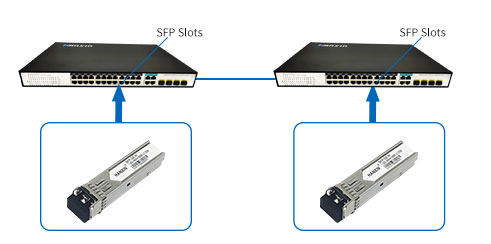SFP — hot-swappable small package module, the current maximum rate can reach 4G, mostly using LC interface
SFP+ —standard package, the working rate is 10G, which can meet the application of Ethernet 10G.
XFP —a standardized package of serial 10G optical transceiver module.
Advantages of SFP+ optical module:
1. SFP+ has a more compact size than X2 and XFP packages (the same size as SFP);
2. It can be directly connected with the same type of XFP, X2, XENPAK;
3. The cost is lower than XFP, X2, XENPAK products.
The difference between SFP and SFP+
1. SFP and SFP+ have the same appearance size;
2. The highest rate of SFP can reach 4G, and the rate of SFP+ is 10G;
3. SFP protocol specification: IEEE802.3, SFF-8472;
4. SFP+ supports digital diagnosis.
The difference between SFP+ and XFP
1. Both SFP+ and XFP are 10G optical fiber modules, and can communicate with other types of 10G modules;
2. SFP+ has a smaller appearance size than XFP;
3. Because of its smaller size, SFP+ moves the signal modulation function, serial/deserializer, MAC, clock and data recovery (CDR), and electronic dispersion compensation (EDC) functions from the module to the motherboard card;
4. XFP complies with the agreement: XFP MSA agreement;
5. SFP+ protocol: IEEE 802.3ae, SFF-8431, SFF-8432;
6. SFP+ is a more mainstream design;
7. SFP+ protocol specification: IEEE 802.3ae, SFF-8431, SFF-8432.

 HANSUN
HANSUN 